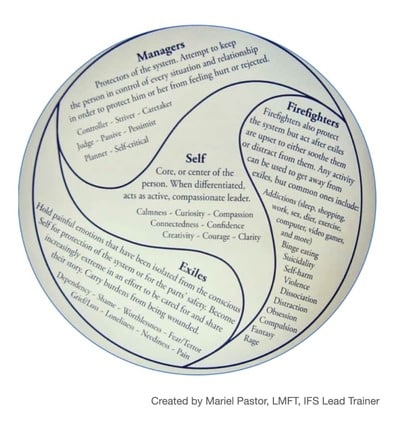
By Trafalgar’s Editorial Team
This Article is Written By Lynn Trauzzi, MACP, RP
What is IFS Therapy?
The newly popular psychotherapy approach Internal Family Systems, more commonly known as IFS, was first developed by Richard Schwartz, PhD in the 1980’s. It is an evidence based approach to treating a wide variety of problems including addiction, anxiety, depression, intrusive thoughts, negative thinking patterns, compulsive behaviours, and traumatic memories. Recent research indicates that IFS helps with some physical problems as well.
In IFS, the person is viewed from a systems perspective. This means that treatment does not focus on symptoms or fixing something, but instead sees a whole person made up of dynamic interrelated parts. The goal of IFS is to identify what parts of an individual are contributing to inner conflicts that manifest as problems in their life. The goal is to understand, relax, and re-establish self-leadership in a person’s psychological system so they can experience calmness, joy, patience, happiness, and increased self-awareness.
The basic assumptions of the IFS model are:
1. It is the nature of the mind to contain an indeterminate number of parts. Have you ever wanted to do something while another part of you did not? Or, held multiple feelings or viewpoints on a single issue? How about having feelings about your feelings. We can all attest to disliking parts of ourselves, such as our anger, fear, procrastination, sadness and so on.
2. Everyone has a self. This is the part of us we are born with and will die with and throughout our lives remains intact and uninjured. It is the part within us that is the source of our healing.
3. Parts are forced into roles due to negative personal, family, cultural, and societal experiences. The impact of these experiences burdens parts with extreme emotions, memories, and sensations.
4. The intention parts have for us is positive, but they often bring about the very thing they are trying to protect us from.
5. Our inner system is organized much like an external family with some parts polarized or forming alliances and hierarchies.
6. Once change occurs in the internal system it affects change in the individual’s external world.
In IFS, parts are arranged into three categories: firefighters, managers, and exiles. Managers and firefighters are referred to as protectors and protect the individual from being overwhelmed by emotions. Strong emotions are held within parts of us referred to as exiles.
Exiles are the vulnerable, and often young parts of us that were at one time overwhelmed with some emotion, such as deep shame, helplessness, loneliness, terror, sadness, emptiness, and feelings of not being good enough. When an exile is activated by an external trigger a person will lose emotional control and become overwhelmed with their long-buried feeling(s).
A manager will work tirelessly to protect exiles from being triggered and flooding you with emotional pain. This is achieved by controlling the external elements of your life like; the people who are kept on or cut-off, activities engaged in or avoided, and even other parts of you. For example, a manager might suppress another part of you or push you to be more of something, like being thinner, richer, tougher, nicer etc…
Firefighters protect when the efforts of managers are not enough to suppress the pain of other parts or exiles. They jump to immediate and powerful action to protect you from feelings that could overwhelm you and were once a threat to your psychological and sometimes physical safety. These are actions that frequently leave you asking yourself, “why?” or “Why did I do that or say that?” The outcomes of firefighters are extremely successful in suppressing feelings but are also destructive to the individual’s psychological and physical well-being and very often to their relationships.

As you can see from the diagram above, within and around these parts is the self. The goal of IFS is to help the individual re-establish self-leadership within the system. This begins when you start to unblend your parts by having awareness of their characteristics and how they are working within. Unblending allows you to choose how you react to surges of thoughts, feelings, and memories, and to relate to yourself with more understanding and compassion.
As you come to directly experience what happened to you and hold curiosity toward your parts and why they are doing their jobs, they begin to soften. It is through this softening and unblending parts that allows the self to step back into its leadership role in the system. As the self inhabits increasingly more space inside you start to have more access to its qualities. In addition to those listed in the above diagram, self is also joyful, playful, persistent, and perseverant.
Wholeness is at the heart of IFS. Wholeness occurs when all your parts are included and feel unburdened and are restored. At this point you begin to trust and welcome all your parts as they often hold information that are not immediately available to your awareness. Once all your viewpoints and options are considered, self decides how to act and what steps need to be taken for the best case scenario of the whole system.
For example, you begin to care for your scared, tired, confused, and needy parts. Although, instead of looking outside yourself to meet those needs you learn to take care of them yourself. You will now begin to notice if a manager or another part is pushing you to ignore these feelings and taking actions to suppress them through a variety of unhealthy behaviours, i.e., using substances, food, love, gambling, shopping, dissociating, tiredness etc…
The practice of noticing your thoughts, feelings and physical sensations with curiosity and self-compassion strengthens your ability to handle stressful situations and times in life.





